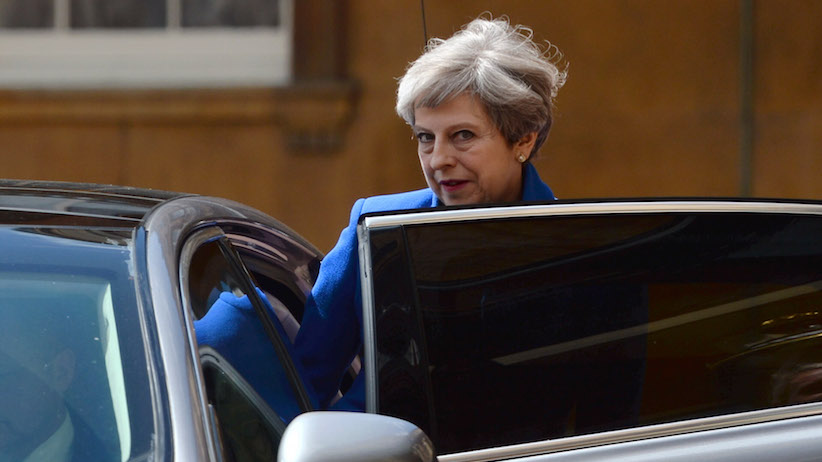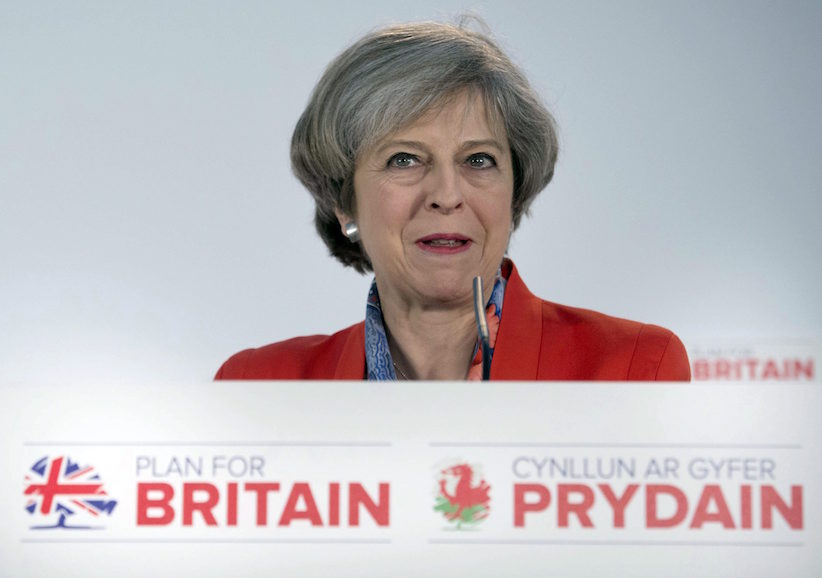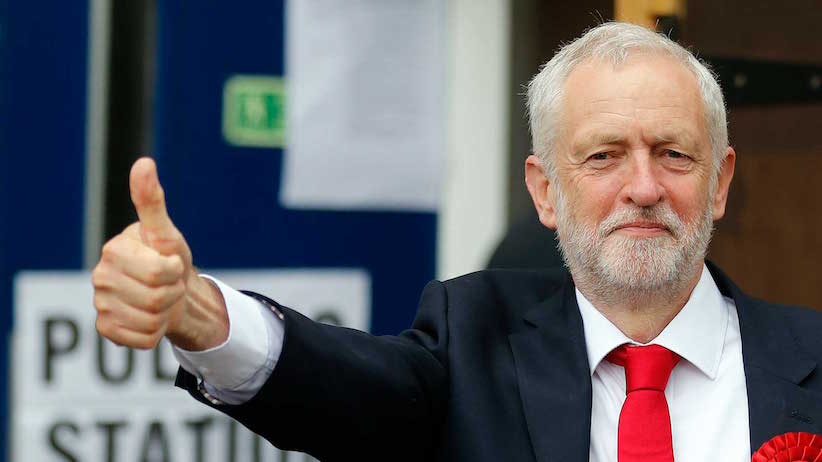How Theresa May doomed her campaign
British Prime Minister Theresa May called it the most important election in a generation but campaigned like she didn’t care. Voters noticed.
Share

“She’s not fit to be prime minister.”
This damning verdict of Theresa May was sent to me last night by a former David Cameron staffer, and came minutes after the shock exit poll suggesting May would no longer be commanding a Conservative majority in the Commons. It typifies Tory sentiment this morning as Britons wake up to the now concrete news of a hung Parliament.
Now, the staffer lost his job when Cameron resigned following his own electoral debacle—last year’s lost Brexit referendum—and so his view is slathered in schadenfreude. But that doesn’t make it wrong. Theresa May appealed for a majority mandate to negotiate a Brexit that would benefit the country. Job decidedly not done.
May might have increased the Tory vote share over the 2015 return by six per cent (at the time of writing), but she’s also lost a dozen seats, enough to lose majority control of the House of Commons. Meanwhile, Labour’s supposedly hapless Jeremy Corbyn increased his party’s vote share by 10 per cent, and his party’s seat count by 29. These figures might shift slightly as the dust settles, even if the outcome won’t.
What went wrong for the Conservatives? Or perhaps the question should be what went right for Labour? Let’s begin with the former.
READ MORE: Theresa May loses, even when she wins
There is no shortage of explanations for Tory failure. The (anonymous) armchair generals of the Conservative Party are busy this morning slating both May’s hermetic campaign and the small team of May advisers responsible for the poorly-received Tory manifesto. They’re correct on both counts.
May walked out of 10 Downing on the morning of April 18 to call the snap election holding a 20 point lead in the polls and brandishing a reputation as a “bloody difficult” woman in total command of her party. She wakes up the morning after the election with a poll advantage of three points and a reputation as the worst campaigner in modern political times. Voters appear to have noticed an unnecessary vote was called opportunistically, and knew where to affix the blame.
It didn’t have to be this way. And the failure is May’s.
The prime minister told the British people it was the most important election in a generation and then campaigned like it was anything but. She hunkered down in her campaign bubble and said little to small crowds of loyal supporters, save for platitudes about the need for “strong and stable” government. At no point did she meet the public or debate the other party leaders to lay out the government’s strategy and goals for the looming Brexit negotiations, i.e. the stated purpose of the campaign.
May’s caution was borne out of a lack of experience on the stump. Having been anointed to replace David Cameron, May’s maiden effort as leader of her party was the national campaign, a tall order for even the most seasoned politician. The Tory decision to focus so much of the campaign on May now looks horribly misguided.
Here, the Tories were following the instruction of campaign guru Lynton Crosby, whose preferred approach is always to define the central issue of the campaign (in this case Brexit) and then hammer the winning message home relentlessly using tightly scripted events. May followed the script, but performed it badly. Her retail skills and empathy were nowhere near that of Cameron or Boris Johnson, two past beneficiaries of Crosby’s guidance.
It didn’t help that May began the proceedings by denting her reputation as a straight talker in triggering an election she repeatedly said she didn’t want. She later bent it completely out of shape with her speedy reversal on the Tory platform’s centrepiece policy on social care, the so-called ‘dementia tax’. This pliability didn’t match the pre-election story spun to voters and the press about the prime minister.

May’s reputation as a competent politician was built over her six year tenure at the Home Office overseeing the nation’s security. Once settled into 10 Downing, the prime minister couldn’t project the same aura onto other files, most notably the economy. Her over-reliance on her co-chiefs of staff to cover the gap was whispered about across Westminster and then exposed on the campaign, where quick decisions from the leader were never forthcoming. The campaign demonstrated no ability to adjust in mid-stream. The two terror strikes during the campaign then struck at May’s supposedly solid record as Home Secretary.
None of this would have mattered had Jeremy Corbyn not exceeded expectations as much as he did.
The Labour leader, pilloried (deservedly) by the press for his shambolic leadership of the Parliamentary Labour Party, welcomed the campaign as an opportunity to burst the Westminster bubble and deliver his message straight to the people.
Impressive rallies were first staged in safe constituencies to build Corbyn’s confidence. An avowedly socialist platform was then presented and well-received by Labour supporters tired of years of Tory austerity. And one group heard the message louder than others: the long-alienated and legendarily apathetic British youth.
READ MORE: Jeremy Corbyn wins, even when he loses
Throughout his troubles at Westminster, Corbyn could always count on the support of the new, younger cohort he’d attracted to the party through its newly-relaxed membership rules. They liked Corbyn because he was “honest” and “genuine”. And where former Labour leader Ed Miliband’s mid-election embrace of celebrities like comedian Russell Brand felt forced, Corbyn was completely at ease (and unimpressed) with the idols listened to by young voters. Corbyn’s perceived authenticity meant the celebrities were on board with the Corbyn agenda, not vice versa. One early unconfirmed estimate suggests youth (18-25) repaid Corbyn by turning out at 72 per cent. If accurate, it would be a stark and unexpected rise from 2015’s figure of 43 per cent.
But Corbyn needed more than youth support to mount a charge against May.

Better than expected performances in key broadcast media interviews—save for a shambolic appearance on the BBC’s Woman’s Hour—gave the broader electorate a different view of Corbyn than the brutal one painted by the Tory tabloid press. With each May stumble Corbyn became a more plausible alternative to the swing voters who watched or listened to these programs. Try as they might, and did they ever, the Tory war machine couldn’t dent Corbyn.
The buzz around Labour’s better than expected result obscures the fact they have no plausible path to forming government. But if Labour continue to keep youth voters engaged, the Tories will have to adapt, and it’s hard to see that adaptation happening under the current generation of Tory leaders at Westminster.
With Brexit talks set to open in days, Theresa May will stay on as prime minister and attempt to win the confidence of the House, possibly through a deal with Northern Ireland’s 10 DUP MPs. May met with the Queen today to present this option.
A DUP deal isn’t expected to last, however. Another election is in the cards, perhaps as early as this autumn.
Jeremy Corbyn will be there to fight it on Labour’s behalf. If the Tories are smart they’ll use the summer to sort out who will replace May, who is too damaged to survive beyond Pimm’s season.
Leading Brexiteers like Boris Johnson and David Davis are already said to be on manoeuvres. While Johnson has significant appeal outside of his party, and is a spirited performer, he also represents the movement that put the country into the ditch with its support of Brexit. The Tories need a clean skin.
Scottish Conservative leader Ruth Davidson is young, gay, and an absolute firecracker in debate and interviews with the press. It’s no coincidence the one bright spot for the Conservatives was their better than expected performance in Scotland.
The Tories need something different to say, said in a different way, with a different leader.
Davidson’s razor-sharp wit, cheerful conservatism, and rock-solid campaign skills could be just the tonic for a tired, closed party bloodied and beaten by two disastrous campaigns.
Andrew MacDougall is a London-based columnist and commentator. He was a director of communications to Stephen Harper.
MORE ABOUT THERESA MAY:
- Theresa May aims to form government, despite lost majority
- Theresa May loses, even when she wins
- Voting begins in U.K. general election
- U.K. election 2017: Live results map
- Are Theresa May’s Tories about to blow the U.K. election?
- Should Facebook tell you more about political ads?
- Would the Liberal Democrats stand a chance in a U.K. election?
- ‘Do you know what a mugwump is?’